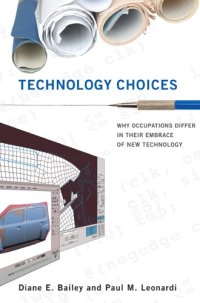
Ebook: Technology Choices: Why Occupations Differ in Their Embrace of New Technology
Author: Diane E. Bailey Paul M. Leonardi
Why do people who perform largely the same type of work make different technology choices in the workplace? An automotive design engineer working in India, for example, finds advanced information and communication technologies essential, allowing him to work with far-flung colleagues; a structural engineer in California relies more on paper-based technologies for her everyday work; and a software engineer in Silicon Valley operates on multiple digital levels simultaneously all day, continuing after hours on a company-supplied home computer and network connection. InTechnology Choices, Diane Bailey and Paul Leonardi argue that occupational factors--rather than personal preference or purely technological concerns--strongly shape workers' technology choices.
Drawing on extensive field work--a decade's worth of observations and interviews in seven engineering firms in eight countries--Bailey and Leonardi challenge the traditional views of technology choices: technological determinism and social constructivism. Their innovative occupational perspective allows them to explore how external forces shape ideas, beliefs, and norms in ways that steer individuals to particular technology choices--albeit in somewhat predictable and generalizable ways. They examine three relationships at the heart of technology choices: human to technology, technology to technology, and human to human. An occupational perspective, they argue, helps us not only to understand past technology choices, but also to predict future ones.
Drawing on extensive field work--a decade's worth of observations and interviews in seven engineering firms in eight countries--Bailey and Leonardi challenge the traditional views of technology choices: technological determinism and social constructivism. Their innovative occupational perspective allows them to explore how external forces shape ideas, beliefs, and norms in ways that steer individuals to particular technology choices--albeit in somewhat predictable and generalizable ways. They examine three relationships at the heart of technology choices: human to technology, technology to technology, and human to human. An occupational perspective, they argue, helps us not only to understand past technology choices, but also to predict future ones.
Download the book Technology Choices: Why Occupations Differ in Their Embrace of New Technology for free or read online
Continue reading on any device:

Last viewed books
Related books
{related-news}
Comments (0)